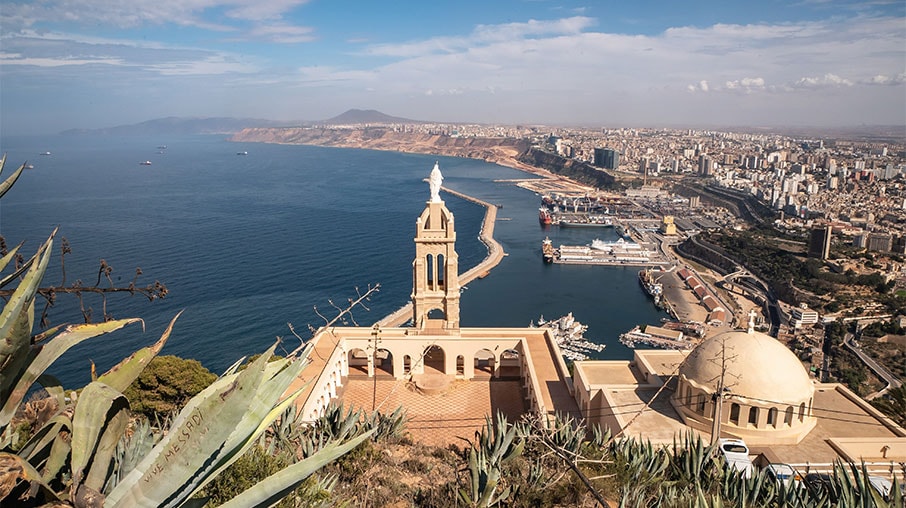Overview
Value-added tax (VAT) was introduced in Algeria in April 1992 and concerns industrial and commercial transactions.
Release date: May 2023
Scope of VAT |
Territoriality of VAT VAT applies only to transactions deemed to be made in Algeria (art. 7 of the Algerian Turnover Tax). Definition of a business deemed to be made in Algeria:
|
Taxable transactions Taxable transactions by nature (art. 1 The Turnover Tax Code ‘CTCA’) VAT applies on:
|
Transactions taxable by specific provision of the law (Art. 2 CTCA) VAT applies on:
|
Taxable transactions by option (Art. 3 CTCA) Natural or legal persons carrying on business outside the scope of VAT may opt to be subject to this tax, to the extent that they supply:
This option is valid for a period expiring on December 31 of the third year following the year in which it took place and renewable by tacit agreement unless expressly waived. |
VAT rates |
VAT rates in Algeria are as follows:
|
VAT registration |
VAT registration in general No VAT registration is required in Algeria. Companies must register with relevant tax authorities, where a tax identification number will be assigned. VAT related to all kinds of operations is declared and paid through monthly declarations called Gn°50. |
Non-residents Non-resident suppliers with no legal presence in Algeria must appoint a representative domiciled in Algeria in order to comply with local regulation and fulfil their VAT obligations, as provided for by Article 63 of the CTCA. Appointing a VAT representative in Algeria is not required in transactions subject to the reverse charge mechanism. Failing this, the tax and, where appropriate, the related penalties shall be paid by the client on behalf of the person not having an establishment in Algeria. |
Input VAT deduction |
Right of deduction Basic principles:
|
Scope of application Right to deduct:
Transactions not giving rise to a right of deduction:
VAT excluded from the right to deduct:
Obligations relating to the right to deduct:
This statement must be supported by a report containing, for each supplier, the following information:
(*) The tax identification number and the trade register number must be authenticated according to the procedure in force. |
VAT free purchases regime |
Overview This regime enables a taxable person who is unable to charge the VAT paid on his purchases to acquire, free of VAT, goods and services intended either for export or for the production of goods expressly exempted by law. The transactions benefiting from this regime are expressly listed by law. This regime needs to obtain an authorisation setting an annual quota of VAT-free purchases from the territorially competent regional tax director (or DGE), under certain conditions and in accordance with a specific procedure. Existence of VAT free purchase formalities and obligations borne by the beneficiary of the authorisation. |
Scope of application Operations benefiting from VAT free purchases regime:
Quota (contingent):
|
Output VAT |
Description Taxable turnover includes the price of goods, works or services, including all costs, duties and taxes, excluding VAT itself. The taxable turnover for self-employment activities is constituted by the gross amount of the fees and revenues realised. The operative event is constituted by:
VAT related to each month is declared and/or paid through the monthly declarations G50 to be submitted before the 20th of the following month. |
Exempt supplies The below operations are exempt from VAT: Business done inside the country
Import business
Export business
|
International trade |
Goods and services Goods and services imports are subject to VAT at the rate of 19% or 9%, except where a specific exemption applies. The taxable base is constituted by the customs value including all duties and taxes, excluding VAT itself. Goods and services intended for export are generally exempt from VAT under some conditions (Article 13 of CTCA). However, there are some exceptions such as sales of antiques, paintings, watercolours, postcards, drawings, original sculptures, engravings or prints, gemstones, rough or cut, fine pearls, precious metals, etc. The taxable base for taxable products is the value of the goods at the time of export, including all duties and taxes, excluding VAT itself. |
Place, time and value of supply |
Operative event and due date Article 14 of the Algerian Turnover Tax Code (CTCA) specifies the operative event as per the below:
|
Time of supply VAT related to each month is declared and/or paid through the monthly declarations G50 to be submitted before the 20th of the following month. |
Value of supply For operations carried out inside the territory: The taxable turnover includes the price of the goods, works or services, all costs, duties and taxes included, excluding VAT itself. For import operations: The taxable base is constituted by the customs value including all duties and taxes, excluding VAT itself. For export operations: The taxable base for taxable products is the value of the goods at the time of export, including all duties and taxes, excluding VAT itself. |
VAT compliance |
Accounting basis and tax period VAT is accounted for at the time of receipt of the invoice. It is declared to the tax authorities under a statement (series G n°50) indicating the turnover realised with the payment of all mandatory taxes. VAT related to each month is declared and paid through the monthly declarations G50 to be submitted before the 20th of the following month. |
Interest and penalties Any late payment of the VAT will give rise to a penalty, calculated on the amount to be paid, by a percentage which differs according to the period of delay:
|
Withholding VAT obligation |
In Algeria, VAT is not declared by a withholding system. Each taxpayer will have to pay the VAT for the transactions carried out. Non-resident suppliers with no legal presence in Algeria have to appoint a representative domiciled in Algeria in order to comply with local regulation and fulfil their VAT obligations, as provided for by Article 63 of the CTCA. In some cases, and under certain conditions, the VAT can be declared and paid by the Algerian customer through the reverse charge mechanism (case of foreign suppliers who do not have permanent business facilities in Algeria) as provided for by Article 83 of the CTCA. |
VAT refunds |
Overview If the deductible VAT cannot be fully offset against the output VAT, the resulting VAT credit can be refunded by the tax authorities, in certain cases restrictively listed by law. The refund is granted to the taxpayer, under certain conditions expressly provided for in the law. A refund application file must be submitted by the taxpayer, in accordance with a specific refund procedure provided for by law. |
Right of reimbursement Refunds are provided for where the deductible VAT cannot be fully offset against the VAT due on taxable transactions carried out by a taxable person, in the following cases:
|
Refund condition
|
VAT record-keeping |
Tax invoice For VAT to be admissible, the invoice must include the following statements:
|
Record-keeping Records of invoices must be kept for a period of 10 years. |
Specific VAT rules |
Bad debts VAT related to bad debts cannot be deducted or refunded. |
Digital economy Sales transactions carried out by electronic means are subject to VAT at the standard rate. |
Land and buildings Transactions relating to immovable property such as land and buildings are subject to VAT at the standard rate. |
Leasing Leasing operations are subject to VAT at a standard rate. |
Secondhand goods Transactions involving used motor vehicles and used bicycles and motorcycles are subject to VAT standard rate. |
Tourism industry Touristic activities are subject to VAT. |
Currency conversion Invoices related to import/export transactions are allowed to be in foreign currency however the applicable VAT shall be converted to Algerian dinars. |
Transfer of business VAT at the standard rate applies to transfer of business and ongoing business. |
Warranty repairs No VAT applies for repairs under warranty as the original goods were costed to allow for such repairs. |
Other indirect taxes |
Import duties There are customs duties in Algeria which can vary from 5 to 30%. In addition, the Internal Consumption Tax can reach 60%. Additional customs duties called Droit Additionnel Provisiore de Sauvergarde or DAPS may be applicable on certain lists of products. The DAPS rate could reach 200%. |
Stamp duty Stamp duty is levied at varying rates on transactions, including the execution of various documents and deeds. |
Other indirect taxes Bank domiciliation tax The bank domiciliation tax is set at 0.5 % for the importation of goods or merchandise intended for resale in the same state and at 1% for the import operations operated within the framework of CKD/SKD, without the amount of the tax being lower than DA 20,000. For importation of services the bank domiciliation tax is set at 4%. The tax on polluting and environmentally hazardous activities This tax applies to the activities listed in the annexure to Executive Decree No. 09-336 of 20 October 2009, which defined the activities subject to the tax on polluting or environmentally hazardous activities and set the multiplier coefficient. Energy efficiency tax The rate of the EE tax, required at customs clearance, varies between 5 and 30% of the ex-works price of the product for locally manufactured products and between 5% and 40% for imported products (by energy class, etc.) according to article 70 of Finance Law 2017. |

























